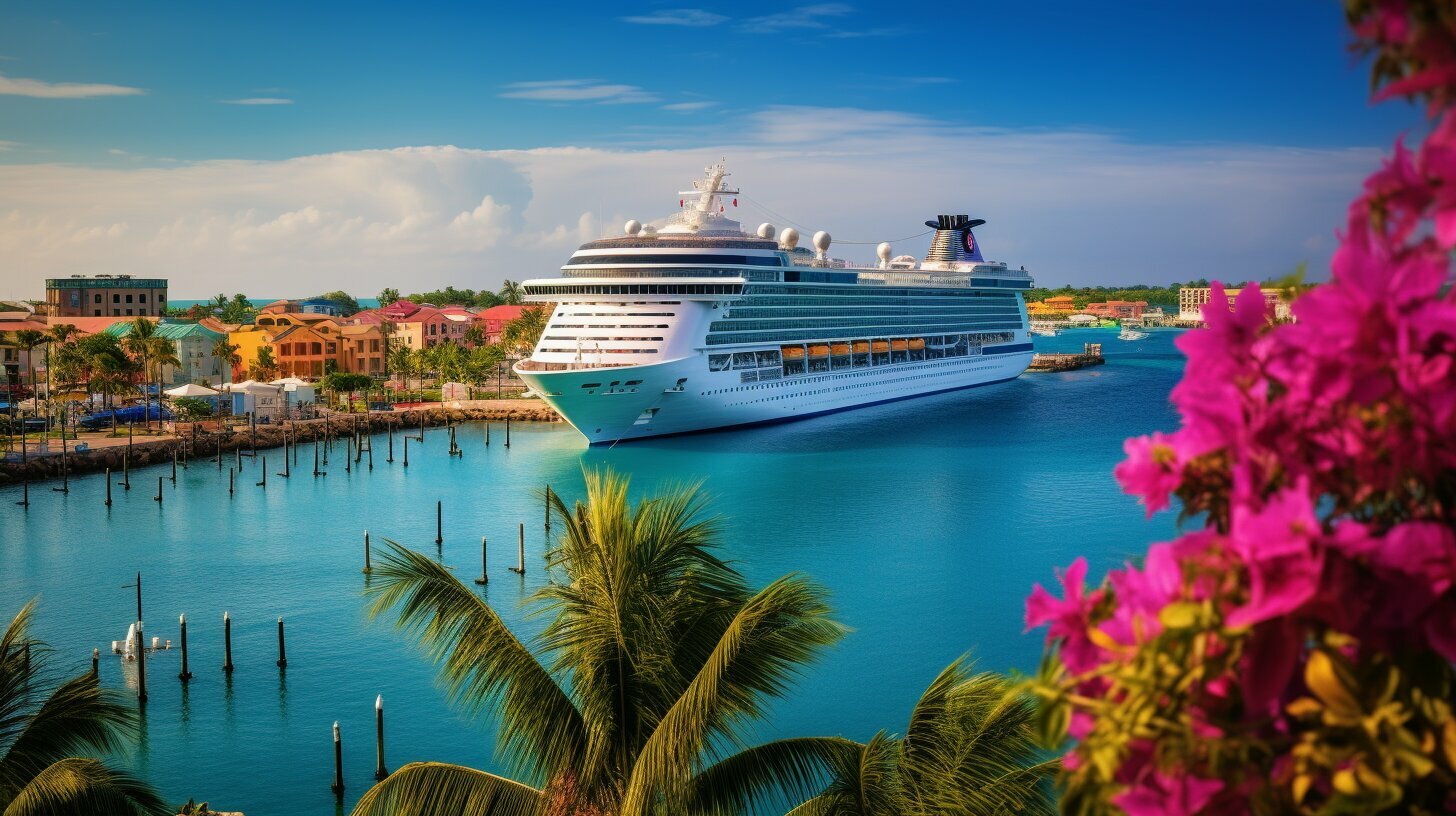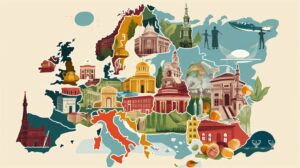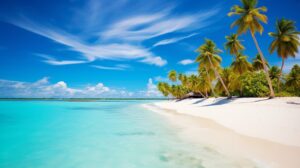What country is The Bahamas in
The Bahamas, an island country known for its stunning resorts and beautiful beaches, is located in the Lucayan Archipelago of the West Indies in the North Atlantic.
Key Takeaways:
- The Bahamas is an island country in the North Atlantic, part of the Lucayan Archipelago.
- The capital of The Bahamas is Nassau.
- The country gained independence from the United Kingdom in 1973.
- The population of The Bahamas is predominantly of African descent.
- The economy is based on tourism and offshore finance.
The Bahamas Geographical Location
Situated within the Lucayan Archipelago of the West Indies, The Bahamas lies in the North Atlantic, surrounded by the Caribbean Sea to the south and the Atlantic Ocean to the east. This island country consists of hundreds of islands, offering a diverse range of geographical features.
The Bahamas can be divided into three main regions based on their geographic locations: the Northwestern Bahamas, Central Bahamas, and the Southeastern Bahamas. The Northwestern Bahamas includes islands such as Grand Bahama, Bimini, and the Abacos, known for their stunning beaches and unique diving opportunities.
The Central Bahamas is home to the capital city of Nassau, located on the island of New Providence. This region also encompasses the Berry Islands, Andros Island, and the Exumas, which are renowned for their picturesque landscapes and crystal-clear waters.
The Southeastern Bahamas consists of islands like Inagua, Mayaguana, and Acklins. These islands are less developed and offer a more secluded and pristine experience for visitors.
The Bahamas Geographical Regions:
| Region | Main Islands |
|---|---|
| Northwestern Bahamas | Grand Bahama, Bimini, Abacos |
| Central Bahamas | New Providence, Berry Islands, Andros, Exumas |
| Southeastern Bahamas | Inagua, Mayaguana, Acklins |
These distinct regions offer a variety of landscapes, from white sandy beaches and turquoise waters to lush forests and vibrant coral reefs. The Bahamas’ unique geographical location makes it a paradise for nature lovers, water sports enthusiasts, and those seeking a tropical getaway.
The Bahamas History and Independence
The Bahamas, once a British colony, gained its independence in 1973 and is now a proud nation within the Caribbean region. Over the course of its history, The Bahamas has undergone significant changes, shaping the country into what it is today.
Before gaining independence, The Bahamas was under British colonial rule for over three centuries. It served as an important strategic location for the British Empire, primarily due to its proximity to the Americas. The islands played a crucial role in trade and communication routes, leading to their development as a British overseas territory.
The road to independence began in the early 1960s when The Bahamas adopted a new constitution, granting the islands internal self-government. This allowed for the establishment of a democratic government and a gradual transition towards full independence. On July 10, 1973, The Bahamas officially became an independent nation, with the Queen of the United Kingdom, Queen Elizabeth II, as the head of state.
Key Events and Milestones
Throughout its history, The Bahamas has experienced significant events that have shaped its path towards independence and its development as a nation.
- The first recorded landfall in The Bahamas was by Christopher Columbus in 1492 during his voyage to the Americas.
- The islands were subsequently colonized by the Spanish, the French, and eventually the British, who established full control in the 18th century.
- During the American Civil War, The Bahamas served as a base for Confederate blockade runners, resulting in economic prosperity for the islands.
- The 20th century saw the rise of tourism as a major industry in The Bahamas, attracting visitors from around the world and contributing to the nation’s economic growth.
- On July 10, 1973, The Bahamas officially gained its independence, establishing a parliamentary democracy and becoming a member of the Commonwealth of Nations.
Today, The Bahamas stands as a vibrant nation, known for its rich cultural heritage, stunning natural beauty, and warm hospitality. Its journey from a British colony to an independent nation is a testament to the resilience and determination of its people.
| Year | Event |
|---|---|
| 1492 | Christopher Columbus makes the first recorded landfall in The Bahamas |
| 18th century | The British establish full control over The Bahamas |
| American Civil War | The Bahamas serves as a base for Confederate blockade runners |
| 20th century | Tourism becomes a major industry in The Bahamas |
| 1973 | The Bahamas gains independence |
The Bahamas Culture and Population
The Bahamas boasts a vibrant and diverse culture, with a population predominantly of African descent. This rich cultural heritage is reflected in the music, art, cuisine, and traditions of the country. The Bahamian people are known for their warm hospitality and love for celebrating life. The population of The Bahamas is estimated to be around 393,000, making it one of the smaller countries in the region.
One of the most significant cultural influences in The Bahamas is African music and dance, which has shaped the island’s unique sound. Junkanoo, a traditional Bahamian festival, is a lively celebration that features vibrant costumes, rhythmic music, and energetic dance performances. It is a testament to the resilience and creativity of the Bahamian people, as the festival has its roots in the days of slavery when slaves were given three days off during the Christmas season to celebrate in their own way.
The melting pot of cultures in The Bahamas also gives rise to a diverse culinary scene. Traditional dishes include conch fritters, fried fish, boiled fish, and peas and rice. Bahamian cuisine combines local ingredients with African, Caribbean, and British influences, resulting in a unique blend of flavors and tastes. Seafood is a staple in the diet of many Bahamians, given the country’s abundant marine resources.
Bahamian Islands and their Populations
| Island | Population |
|---|---|
| Nassau (New Providence) | 274,400 |
| Grand Bahama | 51,000 |
| Andros | 7,500 |
| Exuma | 7,300 |
| Abaco | 17,200 |
Overall, The Bahamas’ culture and population reflect the country’s rich history and the diversity of its people. From the rhythmic beats of Junkanoo to the delicious flavors of Bahamian cuisine, there is something for everyone to experience and enjoy in this beautiful island nation.
The Economy of The Bahamas
The economy of The Bahamas is primarily driven by tourism and offshore finance, making them crucial pillars of the country’s economic stability. With its pristine beaches, crystal-clear turquoise waters, and vibrant marine life, The Bahamas attracts millions of tourists each year, contributing significantly to the nation’s revenue. From luxury resorts in Nassau to secluded island getaways in the Out Islands, the tourism industry offers a wide range of experiences for visitors seeking relaxation, adventure, and cultural immersion.
In addition to tourism, offshore finance plays a significant role in The Bahamas’ economy. The country’s favorable tax laws and financial services sector have made it an attractive destination for international businesses and investors. Many offshore banks, trust companies, and investment firms have established a presence in The Bahamas, capitalizing on its stable political environment, well-regulated financial system, and proximity to major markets. This sector provides employment opportunities and contributes to the country’s overall economic growth.
Table: Key Economic Indicators of The Bahamas
| Indicator | Value |
|---|---|
| Gross Domestic Product (GDP) | $12.3 billion (2019) |
| Tourism Revenue | $2.8 billion (2019) |
| Financial Services Contribution to GDP | Approximately 15% |
| Unemployment Rate | Approximately 10% |
While the tourism and offshore finance sectors are vital to The Bahamas’ economy, the country has also been actively diversifying its industries to reduce dependency on these sectors. Efforts have been made to promote sectors such as agriculture, manufacturing, and renewable energy. The government has implemented various initiatives and incentives to attract foreign direct investment and stimulate economic growth in these areas. By diversifying its economy, The Bahamas aims to create more sustainable and resilient industries that can withstand economic fluctuations.
In conclusion, The Bahamas’ economy relies heavily on tourism and offshore finance, which serve as the main drivers of economic activity. These sectors not only generate revenue and employment opportunities but also contribute to the overall development of the country. With ongoing diversification efforts, The Bahamas aims to foster a more robust and resilient economy that can adapt to changing global dynamics.
The capital and highlights of The Bahamas
The capital of The Bahamas is Nassau, a bustling city that serves as a gateway to the country’s many exciting and picturesque islands, known for their abundance of snorkeling, scuba diving, and stunning beaches. Located on the island of New Providence, Nassau offers a mix of historical charm and modern amenities, making it a popular destination for travelers from around the world.
With its crystal-clear turquoise waters and white sandy beaches, The Bahamas is a paradise for beach lovers. From the famous Cable Beach to the secluded shores of Andros Island, visitors can enjoy endless hours of sunbathing, swimming, and water sports. The vibrant underwater ecosystem also invites adventurers to explore its colorful coral reefs and swim alongside tropical fish.
In addition to its natural beauty, The Bahamas boasts a rich history and vibrant culture. Visitors can immerse themselves in the country’s past by strolling through the charming streets of Nassau, where colonial architecture and historic landmarks stand as a testament to its heritage. The Bahamas is also known for its Junkanoo festival, a lively celebration of music, dance, and vibrant costumes.
As a leading tourist destination in the Caribbean, The Bahamas offers a wide range of accommodations, from luxury resorts to charming boutique hotels. Whether you’re seeking a relaxing beach retreat or an action-packed adventure, the islands of The Bahamas have something to offer everyone. So pack your bags and get ready to explore this tropical paradise.
FAQ
Q: What country is The Bahamas in?
A: The Bahamas is an island country located in the Lucayan Archipelago of the West Indies in the North Atlantic. It is not part of the United States or Florida.
Q: What is the geographical location of The Bahamas?
A: The Bahamas is located within the Lucayan Archipelago of the West Indies in the North Atlantic.
Q: What is the history and independence of The Bahamas?
A: The Bahamas gained independence from the United Kingdom in 1973. It has a rich colonial history and has achieved significant milestones on its path to independence.
Q: What is the culture and population of The Bahamas like?
A: The population of The Bahamas is predominantly of African descent. The country has a diverse and vibrant culture, with various traditions and aspects that contribute to its unique identity.
Q: What is the economy of The Bahamas based on?
A: The economy of The Bahamas is primarily based on tourism and offshore finance. These industries play a crucial role in driving the country’s economic growth and development.
Q: What are some highlights of The Bahamas?
A: The capital of The Bahamas is Nassau, and it offers a range of attractions and activities for visitors. The country is known for its beautiful resorts, snorkeling, scuba diving, and pristine beaches.



